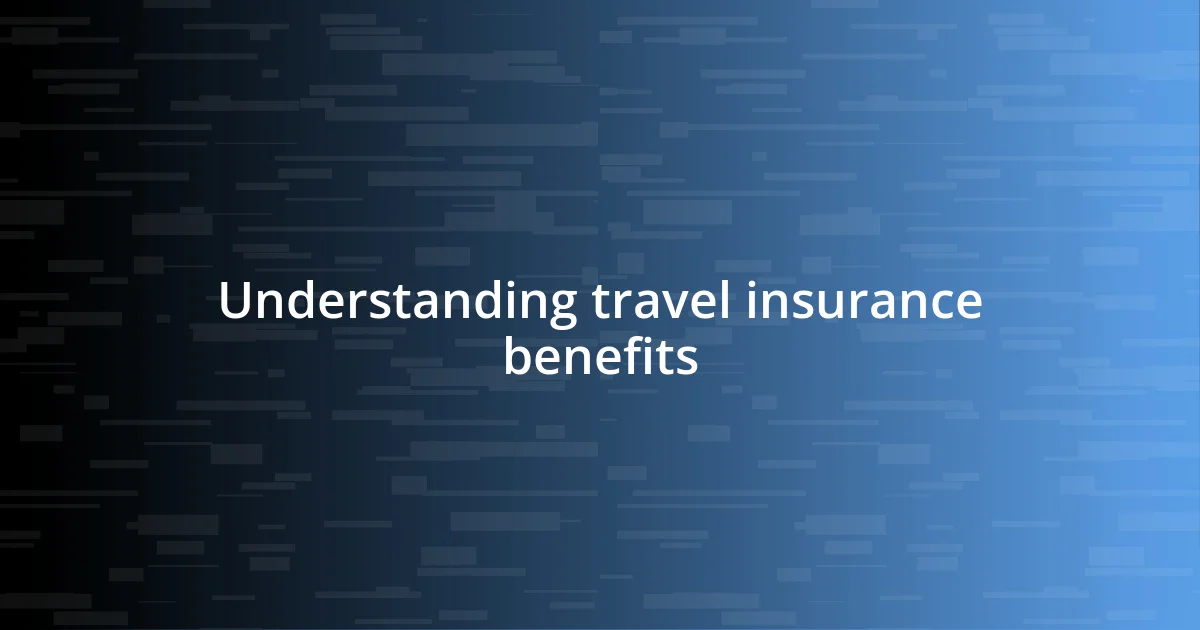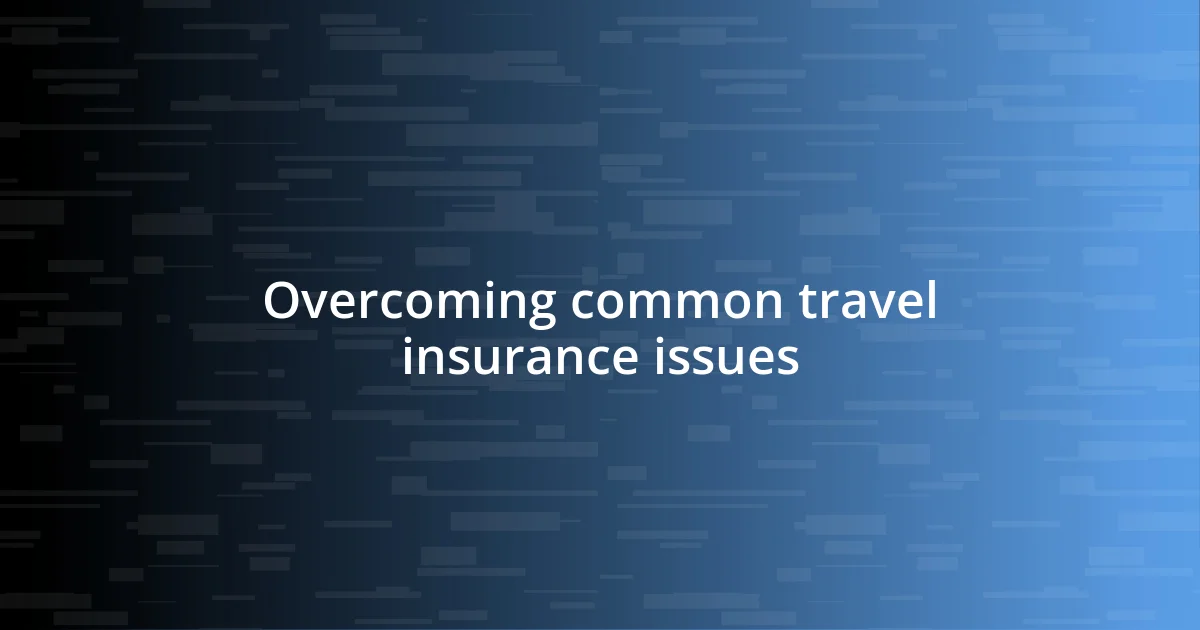Key takeaways:
- Travel insurance provides crucial coverage for medical emergencies, trip cancellations, and lost luggage, offering peace of mind during unexpected situations.
- Understanding your policy’s specifics, coverage limits, and having reliable customer support are essential for effectively navigating travel insurance.
- Patience during the claims process and sharing experiences with fellow travelers can enhance your understanding and make the process less stressful.

Understanding travel insurance benefits
Travel insurance benefits can be a lifesaver, and I’ve experienced this firsthand. Once, while hiking in the Swiss Alps, I twisted my ankle badly. Thanks to my travel insurance, I had access to medical care without worrying about the mounting costs. Isn’t it comforting to know that, in such moments of crisis, a safety net exists to catch you?
Beyond medical emergencies, travel insurance often provides trip cancellation coverage. I vividly remember a time when my flight was canceled due to an unforeseen storm while I was in Southeast Asia. Instead of despairing over lost funds, I submitted a claim and got reimbursed for my hotel and activities. How reassuring is it to have that financial cushion when plans go awry?
Additionally, there are benefits like lost luggage protection that can turn a frustrating mishap into a minor inconvenience. I once had my bag delayed for two days during a trip to Australia. While it was annoying to be without my belongings, my insurance kicked in, covering the essential items I needed while waiting. Can you imagine traveling without those protective layers? It adds a layer of confidence I never travel without now.

Choosing the right travel insurance
Choosing the right travel insurance consists of understanding your unique needs and the specifics of your trip. For instance, when I planned a backpacking trip across Europe, I took into account not only the destinations but also the activities I would engage in, like skiing in the Alps. It’s crucial to compare policies that cover adventure sports, as not all insurers do. Have you ever thought about what would happen if you were injured doing something you love? It’s so important to know what’s covered beforehand.
Another element to consider is the policy limits on medical expenses. During a trip to Thailand, I accidentally stumbled upon a hidden gem of a street market and, well, let’s say I had a little too much street food. I ended up in the hospital with food poisoning, and I was grateful I had a policy with high medical coverage. I can’t stress enough how essential it is to read the fine print. What would you do if faced with a medical emergency far from home? A good policy can be overwhelmingly beneficial.
Lastly, don’t overlook the importance of customer service. I once encountered a charging issue with my travel insurance provider while stranded in a foreign country. I needed assistance quickly, and I was impressed with how responsive and supportive their team was. It made all the difference in my experience. Have you ever had to reach out for help while traveling? Looking for providers with solid reputations in customer service can often be a decisive factor.
| Policy Feature | Considerations |
|---|---|
| Medical Coverage | Ensure it covers your destination and activities. |
| Trip Cancellation | Check for reasons covered under the policy. |
| Customer Support | Prioritize companies with positive reviews. |

Filing a travel insurance claim
Filing a travel insurance claim can feel overwhelming, but I’ve navigated this process a few times and learned some key strategies. The first step is collecting all documents—receipts, medical reports, and any relevant travel information. I remember filing a claim after losing my luggage in Morocco; it felt daunting at first, but having everything organized made the process smoother. Trust me, being proactive saves you lots of stress later on!
- Keep All Documents Handy: You’ll need boarding passes, receipts, and any correspondence related to your claim.
- Notify Your Insurer Promptly: Most policies require you to report incidents within a specified timeframe.
- Be Honest in Your Claims: Misrepresentation can lead to denied claims. I once faced a tricky situation when the insurer questioned a claim; staying truthful resolved it fast.
- Follow Up: Don’t hesitate to check in for updates on your claim status. Persistence often pays off.
I recall when I submitted a claim for trip cancellation due to an unexpected illness. The waiting was nerve-wracking; I kept wondering if all my documents were sufficient. Thankfully, my insurer responded quickly, which gave me peace of mind. Make sure to familiarize yourself with your policy details and the claims process—it really helps alleviate the anxiety of filing a claim.

Overcoming common travel insurance issues
Overcoming common travel insurance issues often comes down to knowing what to expect. I distinctly remember a trip to Greece, where my policy did not clearly indicate coverage for natural disasters. When an unexpected earthquake rattled my plans, I realized the importance of clear communication with the insurer. Have you ever faced an unexpected situation while traveling? Understanding your policy and having direct access to customer support can make a world of difference in those moments.
Another common issue is confusion over claim processes. There was a time when I thought submitting my claim was straightforward after my flight got canceled due to severe weather; turns out, it was anything but! I had to provide copious amounts of documentation that I wasn’t fully prepared for. It taught me that, while it feels tedious, keeping a detailed log of situations and receipts can save you from a lot of headaches later on. Are you keeping all necessary records, or do they sometimes slip through the cracks?
Lastly, I’ve encountered hiccups with reimbursements that stemmed from misunderstandings about eligible expenses. I once had a delightful experience with a cooking class while on a trip to Italy, but when I filed for reimbursement, I learned that it wouldn’t be covered because it was considered a personal indulgence rather than a necessary travel expense. I felt a mix of frustration and disappointment. This experience underscores the necessity of reading the fine print carefully. Have you ever allowed your excitement to blind you from understanding the details? Always dig into what’s explicitly covered so you don’t end up disappointed later.

Tips for maximizing travel insurance
When it comes to maximizing your travel insurance, one crucial tip is to familiarize yourself with your policy’s specifics. I remember preparing for a trip to Japan and getting a pleasant surprise when I discovered my plan covered adventure sports. Had I not delved into the fine print, I might have missed out on experiencing the thrill of paragliding in the mountains. Have you ever been uncertain about the scope of your coverage? Don’t leave room for surprises; know what’s protected.
Additionally, consider enhancing your basic policy with extra riders for specialized coverage. On one occasion, while traveling in South America, I opted for a rider that covered emergencies related to extreme outdoor activities. This small investment gave me peace of mind during a trekking adventure—when another traveler sprained their ankle, I felt secure knowing I was covered if anything went wrong. Isn’t it comforting to know you’re prepared for the unexpected?
Lastly, proactive communication with your insurer is essential. I once had a minor health issue during a Europe trip and decided to call my provider for advice. They not only helped me find a nearby clinic, but they also outlined what expenses would be reimbursable. Have you ever hesitated to reach out for support? Don’t underestimate the power of a simple phone call; it can transform a stressful situation into a manageable one.

Lessons learned from my experience
The journey of understanding travel insurance has taught me to view each policy as a unique roadmap. I once booked a last-minute trip to Thailand, feeling the rush of excitement. However, when I skimmed the policy, I got blindsided by a clause that excluded coverage for non-refundable tickets purchased within 24 hours. That moment taught me the hard way: always read every detail, no matter how tempting the trip may seem. Have you ever overlooked important details in your travel plans?
I’ve also realized the value of patience when dealing with claims. After a fantastic time in Spain, I had to claim for a stolen camera. While waiting for the reimbursement, I found myself growing anxious and frustrated. But then, I reminded myself that the claims process takes time. I learned the importance of remaining calm and following up regularly; it kept my stress in check. Have you ever found yourself impatient during a claims process? Keeping a level head really does pay off.
Another significant lesson for me was the importance of sharing experiences with fellow travelers. After a mishap in Canada where my friend’s luggage was lost, we learned that discussing our policies led to discovering a shared experience with similar coverage. This conversation not only strengthened our friendship but also empowered us both to navigate claims more efficiently. I often wonder—how can your travel buddies help you understand your options better? Engaging with others can transform the travel insurance experience into a valuable learning opportunity.














